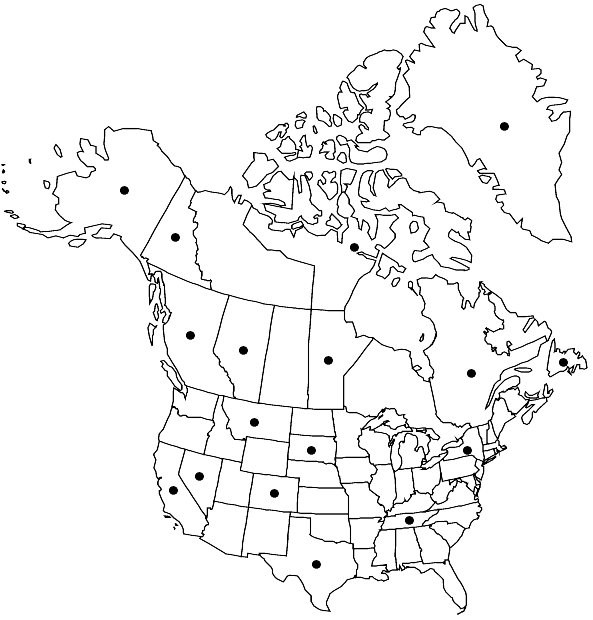Difference between revisions of "Didymodon rigidulus var. icmadophilus"
Cryptog. Bryol. Lichénol. 2: 394. 1981,.
FNA>Volume Importer |
FNA>Volume Importer |
||
| Line 9: | Line 9: | ||
|name=Barbula icmadophila | |name=Barbula icmadophila | ||
|authority=(Schimper ex Müller Hal.) K. Saito | |authority=(Schimper ex Müller Hal.) K. Saito | ||
| + | |rank=species | ||
|publication_title=Syn. Musc. Frond. | |publication_title=Syn. Musc. Frond. | ||
|publication_place=1: 614. 1849 | |publication_place=1: 614. 1849 | ||
| Line 15: | Line 16: | ||
|name=Barbula acuta var. icmadophila | |name=Barbula acuta var. icmadophila | ||
|authority=(Schimper ex Müller Hal.) H. A. Crum | |authority=(Schimper ex Müller Hal.) H. A. Crum | ||
| + | |rank=variety | ||
}} {{Treatment/ID/Synonym | }} {{Treatment/ID/Synonym | ||
|name=Didymodon acutus var. icmadophilus | |name=Didymodon acutus var. icmadophilus | ||
|authority=(Schimper ex Müller Hal.) R. H. Zander | |authority=(Schimper ex Müller Hal.) R. H. Zander | ||
| + | |rank=variety | ||
}} {{Treatment/ID/Synonym | }} {{Treatment/ID/Synonym | ||
|name=Didymodon icmadophilus | |name=Didymodon icmadophilus | ||
| − | |authority= | + | |authority= |
| + | |rank=species | ||
}} | }} | ||
|hierarchy=Pottiaceae;Pottiaceae subfam. Barbuloideae;Didymodon;Didymodon rigidulus;Didymodon rigidulus var. icmadophilus | |hierarchy=Pottiaceae;Pottiaceae subfam. Barbuloideae;Didymodon;Didymodon rigidulus;Didymodon rigidulus var. icmadophilus | ||
| Line 36: | Line 40: | ||
|elevation=low to high elevations (40-2800 m) | |elevation=low to high elevations (40-2800 m) | ||
|distribution=Greenland;Alta.;B.C.;Man.;Nfld. and Labr. (Nfld.);Nunavut;Que.;Yukon;Alaska;Calif.;Colo.;Mont.;Nev.;N.Y.;S.Dak.;Tenn.;Tex.;Mexico;Central America;South America;Europe;Asia;Atlantic Islands (Iceland). | |distribution=Greenland;Alta.;B.C.;Man.;Nfld. and Labr. (Nfld.);Nunavut;Que.;Yukon;Alaska;Calif.;Colo.;Mont.;Nev.;N.Y.;S.Dak.;Tenn.;Tex.;Mexico;Central America;South America;Europe;Asia;Atlantic Islands (Iceland). | ||
| − | |discussion=<p>Variety icmadophilus is similar to < | + | |discussion=<p>Variety icmadophilus is similar to <i></i>var.<i> gracilis</i> in general aspect but the leaf apices are usually hairlike and protuberant, the distal laminal cells are usually smooth and their lumens usually angular. It is common on the North American Plains, where it may occur in association with <i>Didymodon fallax</i>. The former plant is green in young parts, sometimes with a blue-black cast, but commonly red basally, and has boat-shaped elongate, erect leaves that are only slightly incurved when dry, laminal cells smooth and costa excurrent and often flexuose. <i>Didymodon fallax</i> has light green to reddish green color throughout and triangular leaves that are often incurved or even catenulate when dry, costa percurrent and leaves papillose. Variety icmadophilus is rare in the East: Tennessee, Sharp 34606, TENN, and New York, Drummond 120, NY, are apparently this variety.</p> |
|tables= | |tables= | ||
|references= | |references= | ||
| Line 45: | Line 49: | ||
-->{{#Taxon: | -->{{#Taxon: | ||
name=Didymodon rigidulus var. icmadophilus | name=Didymodon rigidulus var. icmadophilus | ||
| − | |||
|authority=(Schimper ex Müller Hal.) R. H. Zander | |authority=(Schimper ex Müller Hal.) R. H. Zander | ||
|rank=variety | |rank=variety | ||
| Line 60: | Line 63: | ||
|publication year= | |publication year= | ||
|special status= | |special status= | ||
| − | |source xml=https://jpend@bitbucket.org/aafc-mbb/fna-data-curation.git/src/ | + | |source xml=https://jpend@bitbucket.org/aafc-mbb/fna-data-curation.git/src/f50eec43f223ca0e34566be0b046453a0960e173/coarse_grained_fna_xml/V27/V27_780.xml |
|subfamily=Pottiaceae subfam. Barbuloideae | |subfamily=Pottiaceae subfam. Barbuloideae | ||
|genus=Didymodon | |genus=Didymodon | ||
Revision as of 22:05, 16 December 2019
Stem leaves appressed to weakly spreading when dry, long-lanceolate, abruptly broadened, oval; costa usually long-excurrent as a straight or flexuose, often fragile subula; proximal cells usually quadrate; distal laminal cells usually smooth, quadrate, with angular lumens, distal lamina rarely 2-stratose in patches; gemmae very rare. Peristome teeth short and straight to long and twisted.
Phenology: Capsules mature summer–fall.
Habitat: Marble, limestone, sandstone, ledges, soil, sand of beaches and dunes, frost boil, old musk ox feces
Elevation: low to high elevations (40-2800 m)
Distribution

Greenland, Alta., B.C., Man., Nfld. and Labr. (Nfld.), Nunavut, Que., Yukon, Alaska, Calif., Colo., Mont., Nev., N.Y., S.Dak., Tenn., Tex., Mexico, Central America, South America, Europe, Asia, Atlantic Islands (Iceland).
Discussion
Variety icmadophilus is similar to var. gracilis in general aspect but the leaf apices are usually hairlike and protuberant, the distal laminal cells are usually smooth and their lumens usually angular. It is common on the North American Plains, where it may occur in association with Didymodon fallax. The former plant is green in young parts, sometimes with a blue-black cast, but commonly red basally, and has boat-shaped elongate, erect leaves that are only slightly incurved when dry, laminal cells smooth and costa excurrent and often flexuose. Didymodon fallax has light green to reddish green color throughout and triangular leaves that are often incurved or even catenulate when dry, costa percurrent and leaves papillose. Variety icmadophilus is rare in the East: Tennessee, Sharp 34606, TENN, and New York, Drummond 120, NY, are apparently this variety.
Selected References
None.